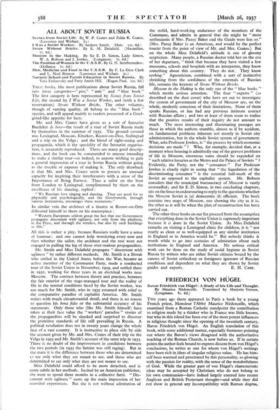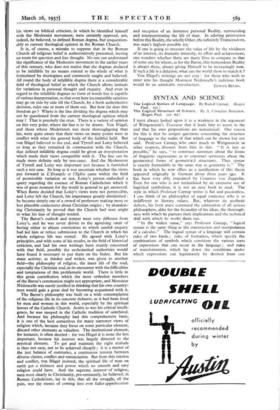FRIEDRICH VON HUGEL
Baron Friedrich von Hiigel : A Study of his Life and Thought. By Maurice Nidoncelle. Translated by Marjorie Vernon. (Longmans. 8s. 6d.)
Two years ago there appeared in Paris a book by a young French priest, Monsieur l'Abbe Maurice Nedoncelle, which examined from a Roman Catholic standpoint the contribution to religion made by a thinker who in France was little known, but who in this island has been one of the most potent influences in religious thought since the opening of the twentieth century, Baron Friedrich von Hugel. An English translation of this book, with some additional matter, especially footnotes pointing out where the Baron's views disagreed with the authoritative teaching of the Roman Church, is now before us. If in certain points the author feels bound to express dissent from von Hiigers conclusions, he writes as one for whom von Hfigers writings have been rich in ideas of singular religious value. He has him- self been warmed and penetrated by this personality, so glowing with the passion for reality, with the sense of the wonderfulness of God. While the greater part of von Hugel's characteristic ideas may be accepted by Christians who do not belong to his own communion—have indeed largely entered into recent Anglican and -British Protestant thought—and while they did not show in general any incompatibility with Roman dogma, his views on biblical criticism, in which he identified himself with the Modernist movement, were certainly opposed, not, indeed, he believed, to defined Roman dogma, but unquestion- ably to current theological opinion in the. Roman Church.
It is, of course, a mistake to suppose that in the Roman Church all religious belief is authoritatively presented, leaving no room for question and fret thought. No one can understand the significance of the Modernist movement in the earlier years of this century, who does not realise that the dogmas declared to be infallible by no means extend to the whole of what is formulated by theologians and i.onniionly taught and believed. All round the body of infallible dogma there is a considerable field of theological belief in which the Church allows latitude for variations in personal thought and enquiry. And even in regard to the infallible dogmas no form of words but is capable of various interpretation, so that even here incompatible opinions may go on side by side till the Church, by a fresh authoritative decision, rules one or more of them out. But how far does this freedom go ? Where is the line dividing the dogma which may not be questioned from the current theological opinion which may ? That is precisely the crux. There is a variety of opinion on this very point, where the line is to be drawn. Von Hilgel, and those whose Modernism was more thoroughgoing than his, were quite aware that their views on many points were in conflict with what the general body of the faithful held. But von Hugel believed to the end, and Tyrrell and Loisy believed so long as they remained in communion with the Church, that defined infallible dogma could be given an interpretation which made their views compatible with it. The line can be made more definite only by test-cases. And the Modernism of Tyrrell and Loisy was important just because it furnished such a test case. So long as it was uncertain whether the views put forward in L'Evangile et l'Eglise came within the field of permissible variation or not, Loisy's person embodied a query regarding the essence of Roman Catholicism which it was of great moment for the world in general to get answered. When Rome decided that Loisy's views were not permissible, and Loisy Ieft the Church, his importance greatly diminished : he became simply one of a crowd of professors making more or less plausible conjectures about Christian origins ; by abandon- ing Christianity he proved that the Church had seen aright to what his line of thought tended.
The Baron's outlook and temper were very different from Loisy's, and he was never driven to the agonising strait of having either to abjure convictions to which candid enquiry had led him or refuse submission to the Church in which his whole religious life was rooted. He agreed with Loisy's principles, and with some of his results, in the field of historical criticism, and had his own writings been mainly concerned with that field, possibly the ecclesiastical authorities would have found it necessary to put them on the Index. But his main activity, as thinker and writer, was given to another field—the philosophy of religion, the inner life of the soul, especially the Christian soul, in its encounter with the difficulties and temptations of this problematic world. There is little in this great contribution which the most orthodox members of the Baron's communion might not appropriate, and Monsieur Nedoncelle was surely justified in thinking that his own country- men would gain a great deal by becoming acquainted with it.
The Baron's philosophy was built on a wide contemplation of the religious life in its concrete richness, as it had been lived by men and women in this world, especially by the spiritual heroes of the Catholic Church. Active as was his critical intelli- gence, he was steeped in the Catholic tradition of sainthood. And because his philosophy had this comprehensive basis, it is one of the best correctives for many narrower views of religion which, because they focus on some particular element, discard other elements as valueless. The institutional element, for instance, is often decried : for von Hiigel it is none the less important, because his interest was largely directed to the mystical element. To get and maintain the right attitude is thus not easy, not to be achieved cheaply ; it is a matter of the just balance of contraries, a continuous tension between diverse claims, conflict and renunciation. But from this tension and conflict, von Hugel insisted, the spiritual life of man on earth got a richness and power which no smooth and easy religion could have. And the supreme interest- of religion, seen most clearly in Christianity, pre-eminently, he believed, in Roman Catholicism, lay in this, that all the struggle, all the pain, was the means of coming into ever fuller apprehension
and reception of an immense persona/ Reality, surrounding and interpenetrating the life of man. In adoring prostration before this Reality, the wholly Other, the infinitely Transcendent, was man's highest possible joy.
If one is going to measure the value of life by the vividness of its interest, its dramatic intensity, its effort and achievement, one wonders whether there are many lives to compare to that of some one for whom, as for the Baron, this tremendous Reality is always there, always giving Himself to be increasingly won. If such a life is a delusion, what can the world show to match it ?
Von Hiigel's writings are not easy : for those who wish to enter into his thought Monsieur Nédoncelle's judicious book would be an admirable introduction. EDWYN BEVAN.











































 Previous page
Previous page